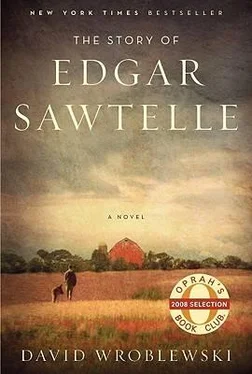Edgar didn’t attempt to help his mother. He did morning chores, then pulled Tinder and Baboo and drilled them on close work-heels, stays, leash tangles, and the things they had been practicing in secret: the tag, the drop, the carrying of small items in their mouths. Claude was bottle-feeding one of the new pups. When he came out of the whelping room, Edgar took the dogs into the field.
And Almondine placed herself along his route wherever he went. If he was behind the barn, she lay near the silo. If he was in the barn, she waited in the shade of the eaves to meet his glance. Each time he refused her. Finally, she lost heart and found a place to sleep. It took a long time for that to happen, but he saw the moment she finally turned away. And he let her go.
JUST BEFORE DINNER Doctor Papineau parked his sedan on the grass behind the Impala. Edgar watched from the barn as the old man clapped a hand on Claude’s shoulder and they walked into the house. Shortly, an unfamiliar pickup slowed to a stop at their driveway and turned and trundled past the house. It was a big truck with an elaborate topper and Texas license plates. His mother and Claude and Doctor Papineau walked out of the house with Almondine trailing. There was something about watching Almondine from the barn, thirty yards distant, something in her carriage, tentative and almost frail, that finally made Edgar understand how cruel he’d been. He made a promise in his mind to make things up to her that night, though there was nothing he could do just then-events required him to stay where he was for a little while longer.
Claude walked around to the driver’s window and gestured at the turnaround. The pickup backed around and stopped again, facing the road. Then the door opened and a man stepped out. There was a short conversation. Almondine greeted the visitor along with the rest of them. Then Edgar’s mother looked over and called, “Edgar, would you bring out Singer and Indigo?”
This was the start of the presentation, in which he’d always played a very specific role. When he’d been little, it had especially impressed new owners to see a child hardly taller than the dogs lead them out of the kennel. Now that he was older, the presentation was less dramatic, but the stagey element remained: after the new owner arrived, after introductions and talk, Edgar emerged with the dog (or dogs, in this case-not uncommon, since they placed many pairs). His father had loved the little choreographed drama of it. After all, he’d said, owners meet their dogs just once. Why not make sure they remember it? It was a small, extra guarantee the dogs would be treated right. Sometimes the owners gasped when Edgar and the dogs appeared; he’d even seen his mother smile, despite her dire predictions, as he measured out steps along the drive, affecting a relaxed, nothing-out-of-the-ordinary expression.
The dogs, excited by a stranger’s arrival, raced one another along the lengths of their pens, pushing out through the canvas flaps to get a look and turning and pushing back in again. Edgar quieted them and walked to the pen that held the two dogs to be placed. Singer was a gloss russet male with an imposing stance but an easygoing demeanor. Indigo was petite for a Sawtelle dog and as black as if dipped in ink, except for a blaze of cream on her chest and another swirl across her hips. Edgar drew the slicker brush from his back pocket and went over them one last time. Indigo’s coat was fine and luxurious when brushed up. The dogs stomped in the straw and panted under his brush. Singer protested the delay with a deep moan.
Hold on, he signed. You’ll know soon enough.
He stroked their faces and squatted in front of them. He made them look at him steadily and he put his hands on their chests, seeking the spot that would calm them. Then he put collars on them and brought them into a heel, one on each side, hands on their withers, and they walked up the barn aisle. When they stepped outside, the knot of people by the house shifted. The talking ceased. Edgar paused for a moment with the old goosenecked light fixture overhead. His father had often joked about hearing angels sing when he and the dogs turned that corner.
“Oh my,” he heard the man say.
When they were halfway up the drive, Edgar patted each dog lightly on the shoulders. They turned to look at him. He flicked out a release and they arrowed forward, all silken motion, feet thumping softly on the ground as they ran. Then there was chaos and introductions. The new owner was a slight man, leanly built, with brown hair and jug ears and a thick mustache. His accent matched his license plate, a heavy drawl. He knew dogs; he presented the back of his hand rather than his fingers; his touch was confident and slow. Occasionally, the dogs might be skittish with a new owner, but not this man and these dogs.
“They sure do look at you, don’t they?” he said.
Edgar’s mother and Claude explained about the gaze exercises and then they introduced Edgar. The man’s name was Benson.
“Pleased to meet you,” Mr. Benson said, shaking his hand. They let Mr. Benson get a good look at the dogs, see their structure. Edgar ran them through recalls to get them moving. Mr. Benson knew what to look for. He checked their stifles and hocks and he commented on their gait. By the time they had finished, the sun was almost set and they walked to the house together, the dogs surging ahead to wait by the door.
“Son,” Mr. Benson said, “you’ve got the touch with these dogs, even more so than your mama.” He turned to Trudy. “No offense, ma’am. I mean that as the highest compliment. I’ve never seen like the way they do for him.”
“None taken,” she said. Edgar could see she was reluctantly charmed by the man, and proud of the dogs’ behavior, which had been flawless. “Edgar makes it look effortless.”
“It’s not even so much effort,” Mr. Benson said. “It’s something else. It don’t have a name. They just want to work for him.”
Edgar’s mother laughed. “Don’t be too impressed. They’re on their best behavior tonight. We’ll go over things more thoroughly tomorrow. Indigo has a couple of bad habits you should know about. But they’re good dogs.”
“Well, I’m daunted by the prospect of living up to what these dogs have been used to,” Mr. Benson said. “I’m not ashamed to admit it. I wonder why they’d listen to a dope like me after working with y’all.”
They downed the two dogs, along with Almondine, in the living room and sat down to dinner. Mr. Benson said he lived in the hill country near San Antonio. He wondered if they had ever been there, and they said no, and he told them about it, the live oaks and the pecan trees and the wild mistletoe and the river. They asked about his trip. The drive had been long, he said, but he loved the open highway, that stretch of asphalt opening out before him.
Edgar sat and listened. Mr. Benson had taken a room at Fisher’s Paradise, south of town. He was staying for several days. He liked to talk, almost a match for Doctor Papineau, but his thoughts ran to philosophy and religion. “Tell you something I think is curious,” he said. “In the Bible there’s hardly no mention of dogs. What there is makes them out like vermin. I can’t make sense of that, can you?”
“Sure,” Edgar’s mother said. “Back in those times, for every dog that lived with people, a dozen more ate garbage and ran through the streets. Companion dogs were the exception.”
The man nodded and looked at all of them. Edgar got the impression he’d raised this question before at other tables.
“‘Give not that which is holy to the dogs, neither cast ye your pearls before the swine’-that’s Matthew. It’s always bothered me. I’m a heathen nowadays, though. People in my congregation fall faint if I walk in on a Sunday. But a lot of them aren’t as holy as a good dog.”
Читать дальше
Конец ознакомительного отрывка
Купить книгу












